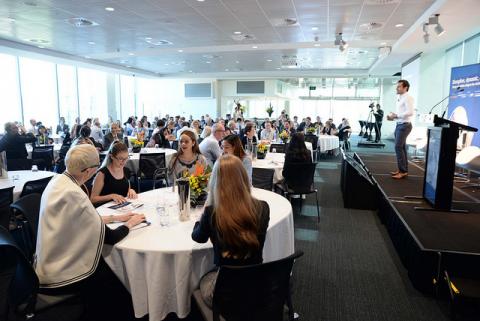“I will continue to include student voices in engagement and panel discussions, to promote awareness and implementation of our strategic goals around student experience and outcomes.”
This was just one of the pledges collected from a university leader at the Times Higher Education Young Universities Summit, held from 5-7 April at the Queensland University of Technology (QUT) in Brisbane.
In a session titled “It’s our future!”, on the final day of the summit, five students from Australian universities asked the delegates from around the world how they could prepare students for the challenges of the 21st century. They were asked to write down an individual commitment to action based on what they had heard at the workshop.
The responses were wide-ranging, but a clear theme was the focus on increasing communication with students.
Some of the responses were as simple as developing regular discussions with students. Others were more in-depth strategic pledges such as creating networks and groups to include the student voice in university policy development. Some were about encouraging dialogue with students with regard to their academic goals and consulting them about changes to the curriculum.
One said that they would “invite students to present at steering committee meetings” and another declared that they would “engage students in the review of our core curricula”.
While some responses were targeted at helping students during their time at university, others focused on how they could help students excel after graduating.
“I will enhance promotion to students on careers services we provide through digital and print channels,” said one leader, while another asserted that they would “create more opportunities to develop employability skills”.
Some of the responses came from students, highlighting that student engagement is a two-way street. These comments reinforced the point that students themselves must take an active interest in their university and engage in conversations around all aspects of university life.
Student experience at young universities
Chinese University of Hong Kong student
Life at the world's best Millennial university
“I will, as a student, be critical of my university and challenge issues around student engagement and accessibility of opportunities,” one student respondent said.
“I will be more engaged with my fellow students as well as the staff members that are supporting QUT,” another student confirmed. “I believe the interaction will improve students’ learning experiences as well as staff members' working environment,” they continued.
Another key theme in preparing students for the 21st century was the emphasis on teaching them to become global citizens. One university leader said that they would “look out for more opportunities for experiences internationally and see if we can involve students in our official international delegates”.
Another said that they would “develop leadership qualities in students by making them aware of various aspects of globalisation on campus”.
The emphasis that these university leaders placed on increasing the volume of the student voice shows how important they believe students are in improving universities. One of the leaders even pledged to replicate the same session at their own university in partnership with their student representative at their senior leadership forum.
Although this session lasted only an hour and 15 minutes, if these pledges are implemented and developed, the impact they could have to shape students and universities across the globe could last far longer.
The full session can be viewed here:
Read more:
Young Universities Summit 2017: video and podcast highlights

Comments